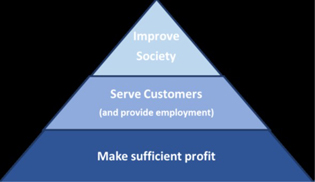It’s the money, isn’t it? Working in financial services means when you go home at the end of the day, you have nothing tangible to show for the hours and effort spent: no goods produced, no house built, maybe some changes in numbers shown on a computer screen.
To see the context of purpose in financial services though, we cannot ignore the wider discussion around purpose in business. A spotlight was thrown on this in 2019 when the US Business Roundtable published a statement on the purpose of the corporation. Crucially this overturned the previous statement defining the principal purpose as maximising returns for shareholders. Instead, they suggested:
“companies should serve not only their shareholders, but also deliver value to their customers, invest in employees, deal fairly with suppliers and support the communities in which they operate.”
This statement came from 181 CEOs in US corporations and was followed up by numerous discussions on the topic. Yet some came to feel things were being taken too far. Terry Smith, whose Fundsmith annual shareholder letter in early 2022 reflected on Unilever’s focus on purpose (especially having seen their shares underperform the market in the previous year)
Consideration of purpose must therefore continue to revolve around who has the power, and how benefits are shared
“A company which feels it has to define the purpose of Hellmann’s mayonnaise has in our view clearly lost the plot. The Hellmann’s brand has existed since 1913 so we would
guess that by now consumers have figured out its purpose (spoiler alert — salads and sandwiches).”
A useful reflection on the purpose of the financial services sector comes from the FCA, in their Discussion Paper in early 2020, and followed by a speech by Jonathan Davidson, Executive Director of Supervision – Retail and Authorisations, given at the 6th Annual Culture and Conduct Forum.
“Put simply, the financial sector channels and guides the investment and funding with which our economy is built, diversifies risks and provides affordable financial support to those in need by advancing credit. It also facilitates every single economic transaction through the payments system.”
The Discussion Paper contains 19 (short) essays on the role of purpose and its connection with culture. Despite having around 19 definitions of purpose – though with substantial common areas (it would make a complex Venn diagram) – there are some useful tools to enable the consideration of purpose and especially its cultural connections.
Joe Garner, CEO of Nationwide Building Society used the pyramid of purpose:
I feel this provides admirable clarity and direction, although a weakness could be the use of the word ‘sufficient’ in the foundation layer. Surely this provides a get out to anyone to argue that sufficient can be seen through the eyes of shareholders ahead of customers and employees? But then Nationwide is a mutual society ‘owned’ by its customers, who is 2023 received a payout based on Nationwide’s financial results. I guess that means Nationwide has effortlessly met the requirement for at least the lower two levels of the pyramid.
But what about organisations, including the majority of financial services firms, who have a shareholder ownership and not mutual model? The discussion here still revolves around shareholder primacy and how shareholders sit alongside other stakeholders. This is usefully summarised by Lynne S. Paine in a recent Harvard Business Review Article on Stakeholder Capitalism. She provides a spectrum of four versions:
Four Versions of Stakeholder Capitalism
Proponents of stakeholderism take varying stances on the strength and basis of their commitment to non-shareholder stakeholders. The spectrum below explains those commitments, from weakest to strongest.
Instrumental
Managers should respect stakeholders’ interests when doing so will maximize long-term returns to shareholders.
Classic
Companies have ethical and legal obligations to stakeholders that must be respected whether or not doing so is likely to maximize shareholder value.
Beneficial
The corporate objective is improving all stakeholders’ well-being (rather than just maximizing value for shareholders).
Structural
To protect stakeholder interests, stakeholders other than shareholders should have formal powers in corporate governance.
Lying behind these four versions is the concept of stakeholder – mainly shareholder – primacy, and shareholder value. The latter is easier to define, although shareholder primacy may run beyond “the sole objective of maximising returns to shareholders”.
Paine argues for greater clarity from organisation about which model of capitalism they are aiming at. Despite the length and depth of annual reports the direction of travel is not always clear. One exception in 2023 came from Shell’s CEO Wael Sawan, in an interview for the Financial Times in June:
“Ultimately what we need to do is to be able to generate long-term value for our shareholders. The answer cannot be ‘I am going to invest [in clean energy projects]and have poor returns and that’s going to vindicate my conscience’ That’s wrong.”
The FT goes on to quote him: “The strength of our company is the level of engagement we have with staff…but we are at risk when we confuse the concept of caring about people, with the decisiveness around how do we actually allocate capital.”
I imagine if you work for Shell at least you know where you stand.
For views on financial services, it is worth reading he FCA’s Discussion Paper which was published just as the UK went into the first lockdown of the pandemic. Yet how are things looking nearly four years later?
The essays still provide a thought-provoking range of approaches and tools to look at the role of purpose and culture. I would highlight two areas mentioned in the DP but which seem to have become more significant since then.
Firstly, the discussion on climate change and the services of banks and insurance companies especially in assisting the exploration and enablement of fossil fuel consumption. Barclays in particular comes in for criticism from environmental bodies (including but not limited to Extinction Rebellion). The continued use of fossil fuels remains an integral part of our society, despite huge increases in the use of renewable energy, and COP 28’s statements remain too recent to see definite changes. The words of Shell’s CEO also give us a clue about possible direction in this area.
The second are concerns how employees of financial institutions feel about their work, and how therefore they contribute to wider society (the top of the Pyramid). Should you be reading this on a Friday I suggest there is a chance you are not in the office in 2024: a significant change since a Friday, or several other working days of the week in early 2020. Working patterns are one aspect of the employment and have an impact on how employees feel about their contribution. Or could a reluctance to return to the office provide a further reflection of doubts about overall purpose?
In financial services despite all the technology, the outcomes of the provision of financial services are the results of human interaction and human decisions. Consideration of purpose must therefore continue to revolve around who has the power, and how benefits are shared. Maybe purpose will be witnessed by a neat equal Venn diagram between employees, shareholders and customers.
The purpose question then moves to the equality of focus about who gets what.
In January 1940 Fred Schwed’s book “Where are the customers yachts?” was first published. This “good hard look at Wall Street” is based on the story of someone in post stock market crash New York being shown the yachts belonging to Wall Street financiers, and is a reflection on the question about who gets what, and suggests that if a Venn diagram was drawn, it would not be equal.
I doubt it is today either. Making money in financial services should be a given. But who gets to benefit – that is the point.
Relevant links and sources
Transforming culture in financial services – driving purposeful cultures DP20/1 March 2020. https://www.fca.org.uk/publications/discussion-papers/dp20-1-transforming-culture-financial-services-driving-purposeful-cultures
https://www.fca.org.uk/news/speeches/business-social-purpose 26.11.20
https://www.fundsmith.co.uk/documents/ annual shareholders letter 2021
https://purpose.businessroundtable.org/
https://hbr.org/2023/09/what-does-stakeholder-capitalism-mean-to-you
https://www.ft.com/content/93b5b140-0303-4b60-8c6f-c7d0d055dd30






